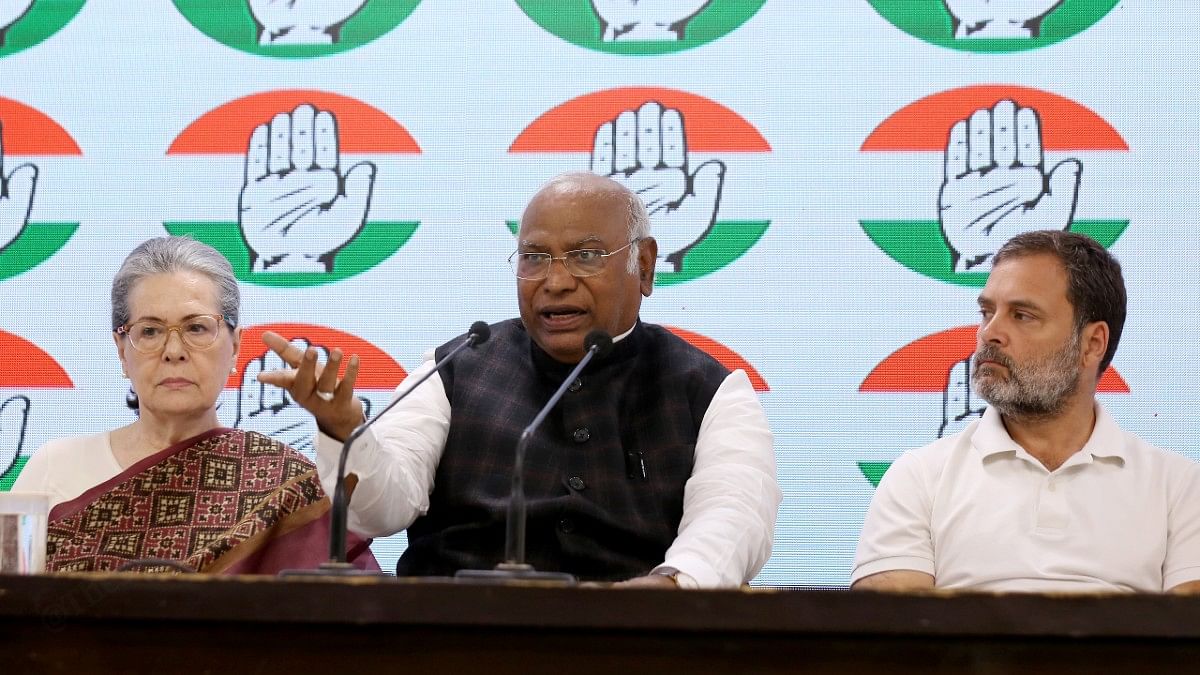New Delhi: A direct fallout of the Congress’s defeat in Haryana has been the party’s reduced leverage in seat-sharing negotiations with its INDIA bloc allies in poll-bound Maharashtra and Jharkhand. With less than a month to go for assembly elections in these two states, a consensus on the number of seats that each party would contest in continues to elude the Congress and its partners.
In Maharashtra, the deadlock is over the Shiv Sena (Uddhav Balasaheb Thackeray) demanding seats that the Congress does not want to part with, while in Jharkhand, the Jharkhand Mukti Morcha is unwilling to accede to the Rashtriya Janata Dal’s demand for more seats, asking the Congress to be more generous instead.
Following a breakdown in alliance talks with the Aam Aadmi Party, the Congress won 37 seats in the 90-member Haryana assembly, trailing behind the Bharatiya Janata Party, which has formed the government in the state for the third-consecutive term.
In Jammu and Kashmir, the Congress and the National Conference (NC) coalition has formed the government, but the former’s performance—winning only six out of 38 seats contested—was seen as a drag.
The picture was quite different till the poll results for these states were announced. The Congress high command was convinced that the victory of the party and its allies in the next round of assembly polls was a foregone conclusion, prompting its regional satraps to lay claim to the chief minister’s post in such an event.
First off the blocks was Maharashtra Congress legislative party leader Balasaheb Thorat, who told party workers during a meeting in the Konkan division last month that he was “100 percent sure that the next state CM will be from the Congress”. Officially, the Maha Vikas Aghadi (MVA) grouping in Maharashtra, comprising Congress, Nationalist Congress Party (Sharadchandra Pawar) and Shiv Sena (UBT) has decided against projecting a CM face.
Thorat’s confidence stemmed from the Congress’ impressive showing in the Lok Sabha elections in the state. where the party won 13 of the 17 seats it contested. It was the party’s best performance since the 2009 general elections, when it had won 17 seats in Maharashtra. In 2014 and 2019, it was forced to settle with two and one seat, respectively.
But the results in Haryana have jolted the Congress’s top leadership, forcing it to contend with difficult allies, while taking care not to slight regional satraps. For instance, in Maharashtra, Shiv Sena (UBT) is locked in a war of words with Congress’s plain-speaking state unit chief Nana Patole, even as the Samajwadi Party (SP) is mounting pressure for more seats in the MVA pie.
The Shiv Sena (UBT) has even warned that it will not participate in talks in the presence of Patole, who is unwilling to share seats with the Thackeray Sena in the Vidarbha region, which the Congress counts as its stronghold. On Monday, however, Shiv Sena (UBT) Rajya Sabha MP Priyanka Chaturvedi said that reports that the Thackerays have approached NCP (SP) chief Sharad Pawar to resolve the impasse were “fake”.
Another Rajya Sabha MP from Shiv Sena (UBT), Sanjay Raut, also downplayed reports of the party’s rift with the Congress, claiming that the MVA has “arrived at a consensus on 210 seats”.
“It is a significant achievement. We aim to contest polls as a joint force and we will defeat the forces looting Maharashtra,” he said. The Maharashtra assembly has 288 seats.
The Central Election Committee (CEC) of the Congress in Maharashtra also got into a huddle Monday, a day after the meeting was postponed as the impasse over seat-sharing dragged on.
In Jharkhand, the RJD was miffed after Chief Minister and JMM supremo Hemant Soren announced that the JMM and Congress will contest in 70 of the 81 constituencies, leaving the rest for other INDIA bloc allies.
RJD Rajya Sabha MP Manoj Jha, the point person from the party for alliance talks, termed Soren’s decision “unilateral”, adding that the party would not settle for less than 12 seats. The JMM, however, remains adamant on its decision, placing the onus on the Congress to placate the RJD by accommodating it from its own quota.
Maharashtra will vote in one phase on 20 November, while polling in Jharkhand will be held in two phases—on 13 and 20 November. The counting of votes will take place on 23 November.
(Edited by Mannat Chugh)
Also Read: In Maharashtra, Congress & Sena (UBT) rift exposed amid war of words, deadlock over seat sharing

